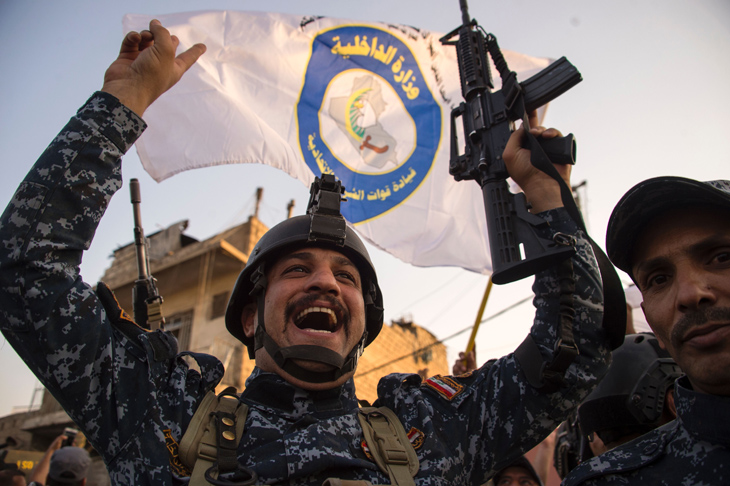For the title of world’s most benighted city, Mosul takes some beating. Liberated from Saddam Hussein by US forces in 2003, the ancient Assyrian town was pummelled by years of insurgency before being seized by Isis in 2014 and its population subjected to militant theocracy. It has no water supply, no infrastructure, it has been gutted by occupation and there are some 850,000 displaced citizens. The Iraqi government’s long and bloody battle to regain what remains of Mosul culminated this week in a visit by Prime Minister Haider al-Abadi to declare victory.
Many will find it hard to see anything to celebrate, given the destruction that has been wrought in the nine-month campaign to free the city from Isis control. The Isis practice of using local people as human shields has meant a deplorably high number of civilian casualties. Not since the siege of Leningrad has war left a city so deep in ruins. Not so long ago, an Iraqi prime minister had to liberate Basra from Islamic death squads who had defeated shamefully under-equipped British forces. These devastating failures of western policy are still being felt.
Nevertheless, the removal of Isis from Mosul is an important and welcome development. Isis, whose brutality needs no recounting here, has been deprived of the city it most needed to give its so-called caliphate material form. As its territory is overrun it looks less a pretend state, more just a terrorist group.
What should give the world hope for Mosul is the manner of its latest liberation. In 2003 the city was taken as part of a lonely military adventure on the part of a US leader and his British sidekick, who then attempted an exercise in building a western-style nation from the outside. In 2017, Mosul has been liberated by the Iraqi government’s ground forces, aided by air support and special forces provided by a coalition of 72 nations, many of them mainly Muslim.
In contrast to 2003, no one can present this year’s events as a latter-day crusade. No one can claim that the battle was really about oil, or that it was driven by neoconservative ideology. The world has come together to defeat Isis because it is in our common interest to do so, because it presents a grave threat to security across the Middle East and beyond.
Present-day Iraq may not fit the western ideal of a democracy, but its government does, nevertheless, broadly represent the will of the people in a way that neither Isis nor US occupying forces could ever do. If the West has learned anything from the past 15 years, it is that people are inclined not to appreciate foreign invasions, even when the invaders insist that they have the best intentions. What worked in western Europe in the 1940s, when a US-led invasion did produce a happy outcome, could not simply be replicated in a country with a very different culture and balance of religions.
There are no easy answers as to how the West should react when faced with a vicious Middle Eastern dictator or group of rebels who are bullying their own people and threatening their neighbours. A policy of partial intervention, where western powers support local forces, is not guaranteed to help the situation. David Cameron and Barack Obama’s initiative in Libya arguably created an even worse outcome than in Iraq: a collapsed state but no power trying to rebuild it. Cameron’s visit to Benghazi in September 2011, in which he declared ‘your city was an inspiration to the world as you threw off a dictator and chose freedom’ is not as well remembered as George W. Bush’s appearance on the USS Abraham Lincoln in front of the banner ‘Mission Accomplished’, but it deserves to be just as notorious. Both were premature declarations of victory by leaders who had failed to understand the forces they had unleashed.
There is a difference between the overthrow of Gaddafi and the liberation of Mosul: while the former created a power vacuum, the latter was led by a legitimate government. As for how to react in Syria — where the country is split between Isis, a malignant Russian-backed dictator and numerous rebel factions — there is still no good option. It is not even remotely clear which is the least-worst option.
But in the case of Mosul, the outside world can take heart from a job that had to be done and which has been done in the most effective way possible: by forces under control of a recognised government, backed by broad-based outside support. This support must now continue as the rebuilding begins, and more resources from the size-able British aid budget should be diverted to this cause.
Berliners who lived through 1945 and the residents of Beirut who survived the 1980s will testify that no city can be too physically ravaged to be beyond repair. It is the spirit of the people and the strength of its institutions, more than its buildings, which make a city.
Iraqis must now be given full support. Perhaps this time a tyranny in the Middle East might be felled without the whole exercise backfiring.
Got something to add? Join the discussion and comment below.
Get 10 issues for just $10
Subscribe to The Spectator Australia today for the next 10 magazine issues, plus full online access, for just $10.
You might disagree with half of it, but you’ll enjoy reading all of it. Try your first month for free, then just $2 a week for the remainder of your first year.














Comments
Don't miss out
Join the conversation with other Spectator Australia readers. Subscribe to leave a comment.
SUBSCRIBEAlready a subscriber? Log in